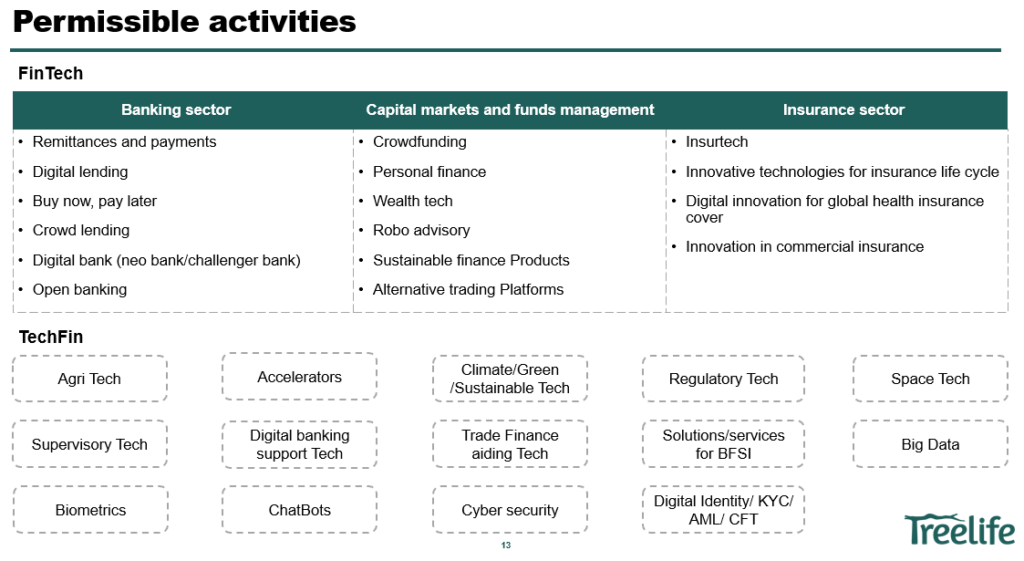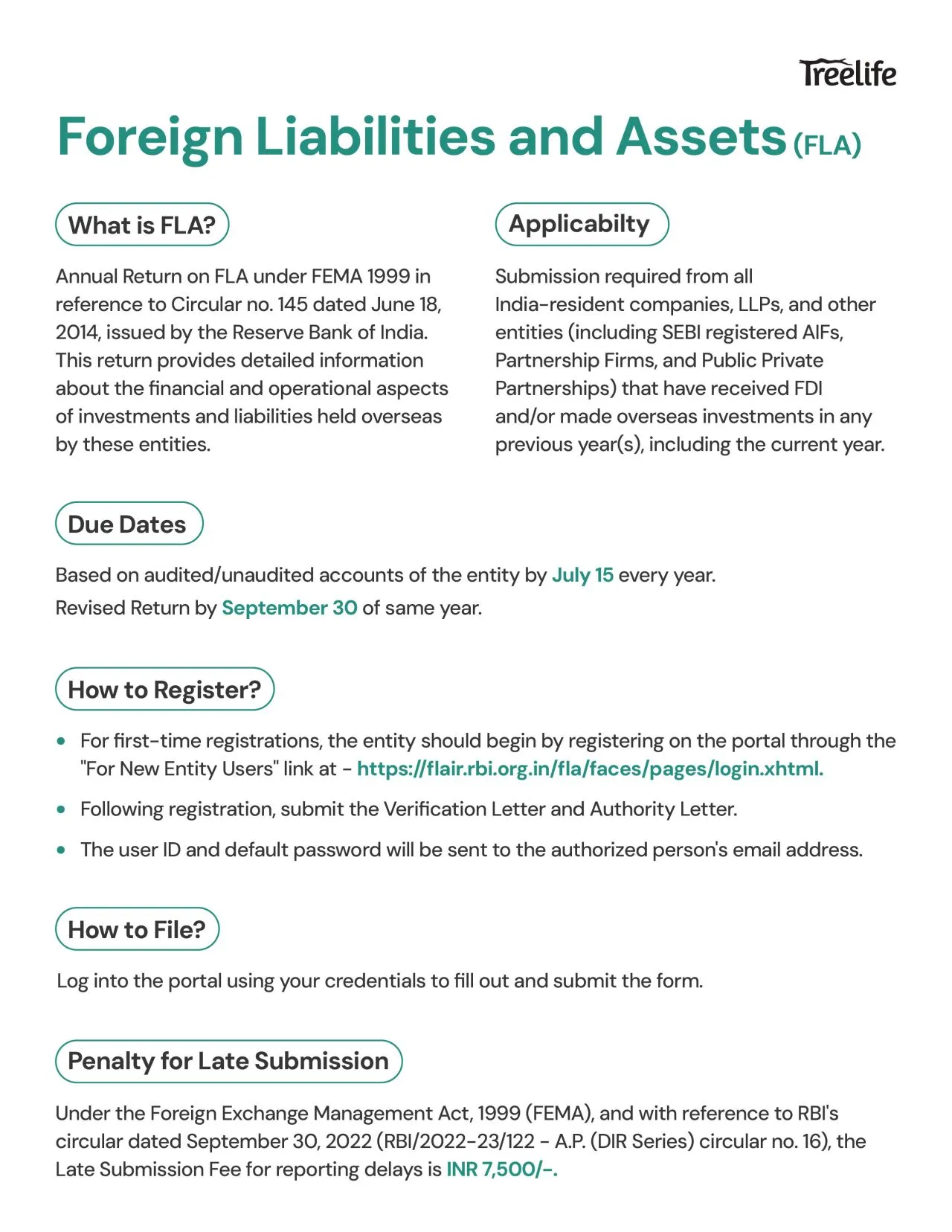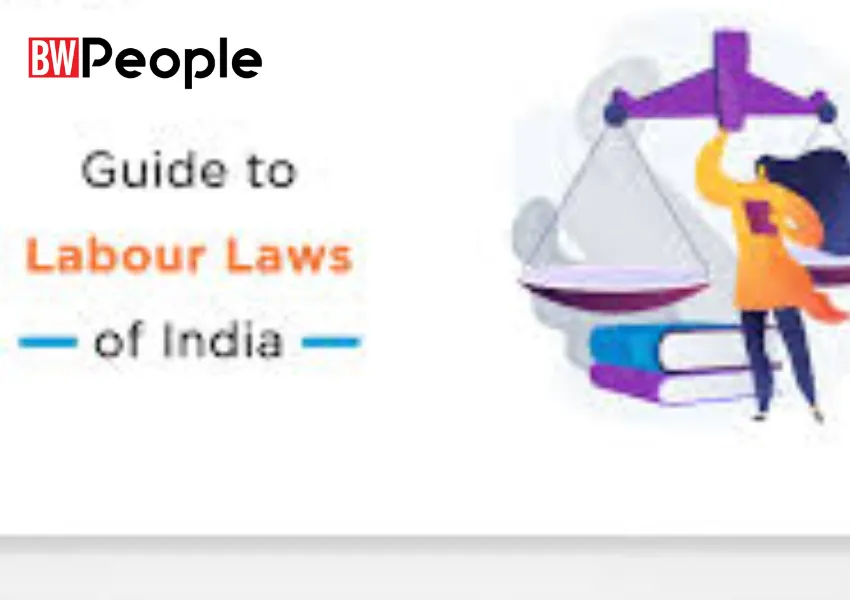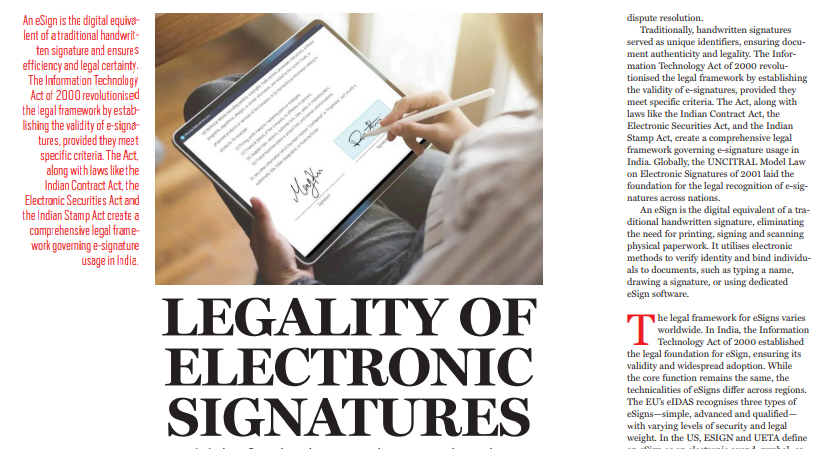Blog Content Overview
- 1 Treelife Resources
- 1.1 Explore our resources to fuel your success and propel your business forward.
- 1.2 Latest Posts
- 1.2.0.1 Informatory Note on Appointment of Company secretary
- 1.2.0.2 Circular Resolution – Understanding Meaning, Process Structure
- 1.2.0.3 Understanding Meetings as per the Companies Act, 2013
- 1.2.0.4 Exciting Growth in Fund Management at GIFT IFSC
- 1.2.0.5 Unlocking Financial Literacy: 10 Key Financial Terms You Should Know
- 1.3 Thought Leadership
- 1.4 The Birth of the FinTech Framework
- 1.5 How to register with IFSCA as a fintech entity?
- 1.6 Who can apply?
- 1.7 Innovating Within the Sandbox
- 1.8 Monetary Incentives for Innovators
- 1.9 The Upcoming Payments Revolution
- 1.10 Why Startups Should Lean Towards GIFT City:
- 1.11 Spotlight on GIFT City SEZ:
- 1.12 The GIFT City Promise:
- 1.13 GIFT City’s Dual Lures: SEZ & IFSC:
- 1.14 GIFT City and the Startup Landscape:
- 1.15 Important Steps
- 1.16 The ‘Transaction Flow’ – A Founders’ perspective
- 1.17 Conclusion
- 1.18 Criteria for Work to Qualify as a “Work for Hire”
- 1.19 “Work for Hire” In The United Kingdom
- 1.20 “Work for Hire” In The United States
- 1.21 “Work for Hire” In India
- 1.22 Similarities and Differences between U.K., U.S., and Indian Approaches
- 1.23 Emerging Trends and Future Outlook
- 1.24 Practical Considerations for Creators and Employers
- 1.25 Conclusion
- 1.26 What is Legal Metrology?
- 1.27 How Does It Work?
- 1.28 What a Consumer Should Know?
- 1.29 What a Business Owner (For Consumer Goods) Should Know?
- 1.30 Challenges and Moving Forward
- 1.31 Conclusion
- 1.32 Understanding Governing Law Clauses
- 1.33 Importance of Governing Law
- 1.34 Exploring Jurisdiction Clauses
- 1.35 Key Considerations in Jurisdiction Clause Drafting
- 1.36 Conclusion
- 1.37 UK and Indian Law
- 1.38 Landmark Judgments in India:
- 1.39 Broader Implications and Legal Perspectives:
- 1.40 Conclusion:
- 1.41 We Are Problem Solvers. And Take Accountability.
Latest Posts


August 14, 2024 | Compliance
Circular Resolution – Understanding Meaning, Process Structure
Read More



August 14, 2024 | Finance
Unlocking Financial Literacy: 10 Key Financial Terms You Should Know
Read More
Thought Leadership

Informatory Note on Appointment of Company secretary
Swipe to view more detailed information on:
1. Who is a Company Secretary?
2. Appointment criteria as per the Companies Act, 2013.
3. Penalties for non-compliance.
4. Key insights and compliance tips.

Circular Resolution – Understanding Meaning, Process Structure
Circular resolutions, as per Section 175 of the Companies Act, 2013, allow the Board of Directors to make urgent decisions without formal meetings. This method is quick, efficient, and essential for time-sensitive matters.
Key Points:
1. Process: Circulate the draft to all directors via hand delivery, post, or electronic means.
2. Approval: Resolution passes with majority approval.
3. Exclusions: Certain significant decisions like issuing securities or approving financial statements must be made in formal meetings.

Understanding Meetings as per the Companies Act, 2013
Our latest document provides comprehensive insights into the various types of meetings mandated by the Act, including the crucial first board meeting for private companies.
Key topics covered include:
1. Board Meetings
2. Annual General Meetings (AGM)
3. Extraordinary General Meetings (EGM)
4. First Board Meeting for Private Companies

Exciting Growth in Fund Management at GIFT IFSC
We’re thrilled to share the remarkable growth in fund management activities at GIFT-IFSC! Our latest infographic highlights the significant increase in the number of FMEs and funds, investment commitments, and quarterly growth. This impressive surge underscores the expanding scale and acceptance of GIFT-IFSC as a premier fund management hub.

Unlocking Financial Literacy: 10 Key Financial Terms You Should Know
At Treelife, we believe that financial literacy is the cornerstone of business success. Understanding key financial concepts can empower you to make informed decisions and drive your business forward. We’ve created this post to help you get familiar with 10 essential financial terms that every professional should know.
Swipe through to enhance your financial knowledge!


Simplified Banking in GIFT IFSC for Foreign Companies
Historically, the PAN (Permanent Account Number) requirement has been a significant obstacle for foreign companies wishing to establish bank accounts in GIFT IFSC. Obtaining a PAN entailed additional compliance in a new jurisdiction, which deterred many from exploring banking opportunities within GIFT IFSC.
Now, foreign companies can bypass the PAN requirement when opening a bank account in GIFT IFSC. They simply need to submit Form No. 60 to the International Banking Units (IBUs) operating in GIFT IFSC.
These foreign companies should not have any income that is chargeable to tax in India.
60 : – Certificate of Registration or incorporation from its home country. – Tax identification number issued in the home country. Both documents must be duly attested by authorized officials of the IFSC banking unit.
1. Indian founders who have flipped their structures offshore might find banking in GIFT IFSC attractive due to its closeness to the Indian mainland. 2. Additionally, IBUs in GIFT IFSC hold an advantage over neo-banks, adeptly handling challenges such as FIRC, KYC for inward remittances, and other FEMA compliances. 3. In light of the recent SVB bank collapse, cross-border SaaS companies and startups, including those backed or funded by overseas accelerators that relied solely on SVB or had a single banking relationship, might view GIFT IFSC as an alternative or backup banking option.
For a copy of the CBDT notification, refer to the link here.
Need more assistance? Call us on 9930156000
The content of this document is for information purpose only and does not constitute advice or a legal opinion. It is based upon relevant law and/or facts available at that point of time and prepared with due accuracy & reliability. Readers are requested to check and refer to relevant provisions of statute, latest judicial pronouncements, circulars, clarifications etc. before acting on the basis of this write up. The possibility of other views on the subject matter cannot be ruled out. By the use of the said information, you agree that the Treelife is not responsible or liable in any manner for the authenticity, accuracy, completeness, errors or any kind of omissions in this piece of information for any action taken thereof.

Fintech Opportunities in GIFT City: A New Era of Innovation
Blog Content Overview
The rapidly evolving financial landscape has placed India on the map for its forward-thinking initiatives. The International Financial Services Centre (IFSC) conceptualized by the Indian government seeks to make India a magnet for both domestic and international investment in the financial arena. Gujarat International Finance Tech-City (GIFT City) stands as a testament to this vision, being the only operational IFSC in India at present. Overseeing its operations, the International Financial Services Centre Authority (IFSCA) maintains a vigilant eye on the financial products, services, and institutions established there.
The Birth of the FinTech Framework
Understanding the need to encourage innovation, IFSCA on 27 April 2022 published a detailed ‘Framework for Fintech Entity in the IFSCs.’ The framework aims to boost the establishment of a world-class fintech hub at the IFSC GIFT City and encourage the promotion of financial technologies across the spectrum of banking, insurance, securities and fund management activities. The framework covers the following:
Entities offering innovative solutions or emerging technologies directly related to financial products and services are welcome to seek authorization under this FinTech Framework. It casts a wide net, encompassing areas such as digital lending, neo banking, crowd funding, Insure Tech, Agri tech, and even niche sectors like Defense tech.
How to register with IFSCA as a fintech entity?
The framework broadly prescribes the following two modes for fintech(s) to register with the IFSCA as a fintech entity (FE):
a. Direct entry (Authorisation by IFSCA)
The framework enables some class/categories of technology entities to obtain direct entry having:
b. Sandbox
An applicant shall be permitted to undertake one or more of the following activities under the IFSCA sandbox:
Who can apply?
Entities from India
Entities from outside India
Applicant as a ‘Fintech Entity’ may do the following:

Innovating Within the Sandbox
A ‘Sandbox’ in the fintech context is a controlled environment where businesses can test their novel products or solutions with a limited set of real customers, for a finite duration. This system, prevalent in GIFT City, allows fintech entities to validate their innovations in the capital market, banking, insurance, and other financial spaces in an IFSC.
Fintech Regulatory Sandbox (FRS)
This is a dedicated space for fintech products/solutions, granting them a limited-use authorization. Successful participants can also avail grants from the IFSCA Fintech Incentive Scheme 2022.
Who’s eligible?
Fintech Innovation Sandbox (FIS) The FIS is an isolated environment away from the live market. Here, fintech entities can experiment with their ideas based on market-related data. A successful journey in FIS paves the way to the FRS.
Who can participate? The eligibility mirrors the criteria set for the FRS.
Inter-operable Regulatory Sandbox (IoRS)
IoRS means a testing environment for innovative hybrid financial products/services falling within the regulatory ambit of more than one domestic financial sector regulator.
The IFSCA will facilitate Indian fintech companies seeking access to foreign markets and foreign fintech companies seeking entry into India. The applications received by the authority from the domestic sector regulator(s)/coordination group of IoRS shall be subjected to the same screening process for entry into IoRS, as given under the fintech regulatory sandbox criteria of this framework.
After a successful exit from IoRS, entities must liaise with the authority and the relevant regulators to obtain necessary permissions before launching the product in the market.
Overseas Regulatory Referral Mechanism by IFSCA
This is a collaboration between the IFSCA and overseas financial regulators. It aids fintech firms that wish to operate reciprocally in each other’s territories. The terms are governed by a mutual agreement or MOU between the IFSCA and the corresponding foreign financial sector regulator(s).
Monetary Incentives for Innovators
Recognizing the potential of FinTech, IFSCA has rolled out an attractive incentive program. Depending on the category of operations, grants can amount to a substantial INR 75 lacs. This scheme caters to a variety of FinTech entities, ranging from those in the Regulatory or Innovation Sandbox to those engaged in any IFSCA-supported programs.
Refer incentive scheme blog for more details
The Upcoming Payments Revolution
Signifying its intent to further boost the FinTech sector, IFSCA has shed light on regulating payment services within the IFSC. Several payment-related projects are already underway, setting the stage for a transformative payment ecosystem.
In conclusion, GIFT City, with its innovative frameworks and conducive environment, is poised to be a global hub for FinTech innovation. With massive opportunities on the horizon, it’s a matter of time before this city becomes synonymous with financial technology excellence.
If you have more questions, reach out to our experts on 9930156000
Disclaimer – The content of this document is for information purpose only and does not constitute advice or a legal opinion. It is based upon relevant law and/or facts available at that point of time and prepared with due accuracy & reliability. Readers are requested to check and refer to relevant provisions of statute, latest judicial pronouncements, circulars, clarifications etc. before acting on the basis of this write up. The possibility of other views on the subject matter cannot be ruled out. By the use of the said information, you agree that the Treelife is not responsible or liable in any manner for the authenticity, accuracy, completeness, errors or any kind of omissions in this piece of information for any action taken thereof.

FinTech Incentive Scheme
On February 2nd, 2022, the International Financial Services Centres Authority (IFSCA) issued a notification introducing the “FinTech Incentive Scheme”.
1. Objective of the Scheme:
The primary aim is to propel India’s IFSC into the league of leading International Financial Centers by financially assisting FinTech activities. The scheme specifically targets:
– Indian FinTechs targeting foreign markets.
– Domestic FinTechs aiming to list on IFSCA-recognised exchanges.
– International FinTechs targeting Indian IFSC market access.
– Foreign FinTechs eyeing Indian markets through the Inter-Operable Regulatory Sandbox (IORS) framework.
– Domestic FinTechs looking to expand their business to the IFSC.
2. Duration of the Scheme:
The scheme will be in operation for three years from its official announcement date.
3. Definitions:
The notification elucidates several terms for clarity, such as ‘FinTech’ being technology-driven solutions assisting Financial Institutions, and ‘Regulatory Sandbox’ being an environment allowing limited real customer interactions for testing FinTech solutions.
4. Eligibility:
To benefit from this scheme, applicants must meet certain criteria:
– If from India, they could be DPIIT-registered startups, companies under the Companies Act 2013, resident individuals, or entities under the purview of regulators like RBI, SEBI, etc.
– If foreign, they should be individuals or entities from FATF compliant nations with a majority (over 51%) non-resident shareholding.
5. Scope:
The scheme grants are designed for those associated with the Authority’s sandbox programs, accelerators, or special collaborations with the Authority.
6. Types of Incentives:
Multiple grants are available, subject to conditions:
– FinTech Start-up Grant: Up to Rs. 15 lacs for startups with innovative FinTech solutions.
– Proof of Concept (PoC) Grant: Up to Rs. 50 lacs for early or mature FEs for conducting a PoC.
– Sandbox Grant: Up to Rs. 30 lacs for developing innovative products or services in a sandbox.
– Green FinTech Grant: Up to Rs. 75 lacs for sustainable finance solutions.
– Accelerator Grant: Up to Rs. 10 lacs for supporting accelerators at the IFSC.
– Listing Support Grant: Up to Rs. 15 lacs for domestic FEs aiming to list on recognized exchanges.
The FinTech Incentive Scheme is an ambitious endeavor by the IFSCA to invigorate the FinTech landscape in India, making it competitive on a global scale. It promises not only to boost domestic enterprises but to attract international entities, thereby fostering innovation, collaboration, and growth in the sector.
Call our experts on 9930156000 to know more
Disclaimer – The content of this document is for information purpose only and does not constitute advice or a legal opinion. It is based upon relevant law and/or facts available at that point of time and prepared with due accuracy & reliability. Readers are requested to check and refer to relevant provisions of statute, latest judicial pronouncements, circulars, clarifications etc. before acting on the basis of this write up. The possibility of other views on the subject matter cannot be ruled out. By the use of the said information, you agree that the Treelife is not responsible or liable in any manner for the authenticity, accuracy, completeness, errors or any kind of omissions in this piece of information for any action taken thereof.

GIFT City: Catalyzing India’s Startup Revolution
Blog Content Overview
Gujarat International Financial Tec-City (GIFT City) stands as an emblem of India’s proactive approach to contemporary finance and business. Positioned as India’s answer to globally recognized financial centers such as London’s Dockyards or Shinjuku in Tokyo, GIFT City is sprawled over 886 acres by the scenic Sabarmati River in the state of Gujarat.
With its inception, it’s not just large-scale businesses that stand to benefit; the Indian startup ecosystem, too, receives a substantial shot in the arm. Here’s a closer look at how GIFT City interlaces with the country’s burgeoning startup culture.
Why Startups Should Lean Towards GIFT City:
- Uninterrupted Fund Flow: Avoid the pitfalls of currency conversion by keeping funds in their original USD form.
- Fluid Repatriability: Transfer funds back to the US or elsewhere, at will.
- Interest Returns: Up to 5% yield potential on Term Deposits.
- Simplified Compliance: No taxing obligations with the GIFT City IFSC functioning akin to an International bank.
- Multi-currency Support: For those without a US bank account, solutions like Razorpay can help facilitate a US-based multi-currency account. This can be a conduit to transfer funds to GIFT City or elsewhere.
Spotlight on GIFT City SEZ:
The Special Economic Zone (SEZ) is a dedicated area meant to lure multinational corporations with a range of benefits from tax breaks to simplified trade regulations.
Key sections include:
– International Financial Services Centre (IFSC): This is GIFT City’s heart, tailored for the financial sector and offering an unparalleled business environment.
– Domestic Finance Centre (DFC): Catering to domestic financial services, the DFC offers a growth-friendly space for Indian financial ventures.
The GIFT City Promise:
- Elevating Financial Infrastructure: GIFT City is positioned to upscale India’s financial framework, offering a nexus for banks, insurance ventures, and other finance-focused entities.
- Foreign Investment Draw: The confluence of contemporary facilities, SEZ privileges, and strategic planning makes GIFT City a magnet for international funds.
- Nurturing Startups: The city’s pro-innovation stance can catalyze startup growth, foster innovation, and generate employment.
- Minimizing Offshore Dependence: GIFT City offers a compelling alternative to other Asian financial hubs, potentially rerouting Indian business that would otherwise head to places like Singapore or Hong Kong.
- Global Economic Footprint: As GIFT City thrives, so does India’s stature in global financial circles.
GIFT City’s Dual Lures: SEZ & IFSC:
– SEZs cater to attracting Foreign Direct Investment (FDI) by offering a conducive environment for exports and finding global markets. Goods and services from SEZs are treated distinctively, often enjoying tax benefits and simpler trade regulations.
– IFSC, within GIFT City, offers a consolidated platform for diverse financial services. From stock exchanges to risk management, this hub simplifies growth trajectories for businesses, all while offering tax and regulatory perks.
GIFT City and the Startup Landscape:
Startups stand to gain manifold:
– Diverse Funding Avenues: GIFT City’s global orientation ensures startups have broader access to funding.
– Pro-Business Ambience: From tax breaks to a unified clearance system, doing business is seamless.
– Innovation as a Pillar: GIFT City’s forward-looking approach fosters startup growth.
– Partnership Potentials: The city’s diverse business landscape offers numerous collaboration opportunities.
– Ready Talent Pool: GIFT City’s vicinity is replete with skilled professionals, ensuring startups have ready access to talent.
– Global Exposure: The city’s international ethos ensures startups think beyond domestic confines.
– Sustainability Drive: GIFT City’s green commitment appeals to eco-conscious startups.
In wrapping, GIFT City isn’t just an infrastructure marvel but a strategic move, poised to revolutionize India’s startup scene. Especially in the backdrop of global financial shifts, like the SVB crisis, GIFT City stands tall, beckoning entrepreneurs and investors alike. As India pitches itself as an Asian financial linchpin, GIFT City is, undoubtedly, its crown jewel.
Got a question? Call us on 9930156000
Disclaimer – The content of this document is for information purpose only and does not constitute advice or a legal opinion. It is based upon relevant law and/or facts available at that point of time and prepared with due accuracy & reliability. Readers are requested to check and refer to relevant provisions of statute, latest judicial pronouncements, circulars, clarifications etc. before acting on the basis of this write up. The possibility of other views on the subject matter cannot be ruled out. By the use of the said information, you agree that the Treelife is not responsible or liable in any manner for the authenticity, accuracy, completeness, errors or any kind of omissions in this piece of information for any action taken thereof.

GIFT City and its Tax Implications: A Deep Dive
Blog Content Overview
The Gujarat International Finance Tec-City, commonly referred to as GIFT City, stands as a testament to India’s vision to create a world-class financial and IT services hub. Designed to compete with global financial centres, GIFT provides state-of-the-art infrastructure, facilities, and operational ease for institutions and corporations. One of the major attractions of GIFT City is its tax framework which has been designed to encourage businesses to set up shop there.
TAX FRAMEWORK
- Income-tax
- Direct Tax:
Units in IFSC:
- Enjoy a 100% tax exemption for 10 consecutive years out of 15 years.
- Minimum Alternate Tax (MAT) for companies or Alternate Minimum Tax (AMT) is levied at 9% of book profits for others set up as a unit in IFSC. However, MAT is not applicable to companies in IFSC choosing the new tax regime.
- Dividend income given out by a Company in IFSC will be taxed in the hands of the shareholder.
- Dividend obtained by non-residents from an IFSC unit is taxable at a concessional rate of 10% plus the applicable surcharge and cess.
- No surcharge or health and education cess applies to certain incomes earned by specific funds in the IFSC.
Investors:
- Interest income paid to non-residents on money lent to IFSC units is not taxable. For Long Term Bonds and Rupee Denominated Bonds listed exclusively on a recognized stock exchange in IFSC, the tax rates vary:
- Issuance before 01 July 2023 is taxed at a lower rate of 4%.
- Issuance on or post 01 July 2023 is taxed at 9%.
- Transfers of particular securities* listed on IFSC exchanges by a non-resident or Category III AIF located in IFSC are not treated as transfer, meaning gains accruing are not chargeable to tax in India.
- Income from a variety of non-resident transactions in IFSC, such as on transfer of non-deliverable forward contracts or offshore derivative instruments or over-the-counter derivatives or distribution of income on offshore derivative instruments entered with an Offshore Banking Unit of an IFSC, are exempt from tax.
- Income obtained by a non-resident from a portfolio in IFSC that accrues or arises outside India is also exempt from tax.
* Specified securities include Bond, GDR, Foreign currency denominated bond, Rupee- denominated bond of an Indian company, Derivatives, Unit of a Mutual Fund, Unit of a business trust, Unit of Alternative Investment Fund and Foreign currency denominated equity share of a company
- Goods and Services Tax (GST)
Units in IFSC:
- No GST is levied on services received by a unit in IFSC.
- GST is, however, applicable on services provided to Domestic Tariff Area (DTA).
Investors:
- All transactions carried out in IFSC exchanges are exempt from GST.
- Other taxes & duties
Units in IFSC:
- State Subsidies include relief on lease rental, Provident Fund (PF) contribution, and electricity charges.
Investors:
- Exemptions are provided from Securities Transaction Tax (STT), Commodity Transaction Tax (CTT), and stamp duty for transactions on IFSC exchanges.
GIFT City, with its conducive tax framework, provides numerous opportunities for businesses and investors alike. The tax incentives are strategically designed to make the IFSC in GIFT City an attractive proposition for international financial services. As the city continues to evolve, it promises to be a cornerstone for India’s financial aspirations on the global stage.
Want to know more about the tax implications? Consult our experts on 9930156000
Disclaimer – The content of this document is for information purpose only and does not constitute advice or a legal opinion. It is based upon relevant law and/or facts available at that point of time and prepared with due accuracy & reliability. Readers are requested to check and refer to relevant provisions of statute, latest judicial pronouncements, circulars, clarifications etc. before acting on the basis of this write up. The possibility of other views on the subject matter cannot be ruled out. By the use of the said information, you agree that the Treelife is not responsible or liable in any manner for the authenticity, accuracy, completeness, errors or any kind of omissions in this piece of information for any action taken thereof.

Demystifying the ‘Transaction Flow’ of VC Deals
Blog Content Overview
The ‘transaction flow’ refers to the various stages involved in a Company obtaining funding from an Investor. Given that this imposes numerous obligations on the Company and the Founders, it becomes critical for Founders to have a clear understanding of the steps involved in receiving funding from an Investor. However, fledgling startups often find the complex terms involved overwhelming and are thus unable to gain a clear picture of the process flow involved in raising funding.
Important Steps
- Term Sheet – a non-binding agreement that outlines the basic terms and conditions of the transaction.
- Transaction Documents – refers to the agreements required to be entered into between the parties to lay down the governing framework of the investment. This would typically take the form of a securities subscription agreement (“SSA”) and a shareholders’ agreement (“SHA”), or a variation of the same known as a securities subscription and shareholders’ agreement (“SSHA”). These agreements will contain detailed language on the nature of each party’s rights and obligations under the contract and will be binding on the parties.
- Execution – refers to the stage where the parties actually sign and ‘execute’ the Transaction Documents, validating the same and binding the parties to the terms agreed.
- Conditions Precedent – refers to the conditions required to be completed by the Company and/or Founders to the Investor’s satisfaction before the investors wire the funds to the Company’s bank account (also referred to as Closing). The conditions precedent shall be completed in parallel with execution of transaction documents so that there is no delay in Closing.
- Closing – refers to the stage at which the funds are received by the company and securities are allotted to the Investors.
- Conditions Subsequent – refers to the conditions required to be completed by the Company and/or Founders after Closing, typically include conditions arising out of due diligence of the company and other compliance related steps.
The ‘Transaction Flow’ – A Founders’ perspective
| Important Terms | Points to bear in mind for Founders |
|---|---|
| Term Sheet | A Term Sheet helps layout the structure for the Transaction Documents and can help establish the negotiated position on critical terms early in the process, which in turn, enables a quick flow from drafting and vetting of agreements to Execution. Term Sheets are non-binding and the terms, although not advisable, but, can vary in the transaction documents. |
| Due Diligence | A due diligence exercise reviews the records maintained by the Company to ascertain whether the Company’s operations are in accordance with the applicable law. The findings are then highlighted to the Investors basis the magnitude of risk involved in a due diligence report.
Typically, startups have trouble ensuring the secretarial compliances prescribed under Companies Act, 2013 (and relevant rules thereunder) or compliances prescribed under labour legislations, and rectifying the same is made a Condition Precedent or a Condition Subsequent. This would vary from Investor to Investor, based on how risk averse they are. |
| Transaction Documents | In the event that the Company has already completed previous round(s) of funding, Founders must pay heed to the rights of existing Investors and ensure that the appropriate waiver of rights (as applicable) is captured in the agreements. Further, in case of an existing SHA with Investors from earlier rounds of funding, the parties would execute an amendment to SHA or a complete restated SHA, which would be signed by all shareholders of the Company, in addition to the incoming Investors. Consequently, the transaction documents would require consensus of terms from both existing and incoming Investors.
It is also important to note that employment agreements between the Founder(s) and the Company (sometimes prescribing specific conditions of employment by Investors) are often made part of this stage. |
| Execution | Every agreement would require payment of stamp duty to the competent state government. The duty payable varies from state to state and agreement to agreement, and is either a fixed value or a percentage (%) value of the investment amount (i.e., the ‘consideration’). The Stamp papers are required to be procured prior to the execution of the transaction documents.
Execution can be done through either wet ink or digital signatures. |
| Conditions Precedent | This usually encompasses a variety of obligations on the Company/Founders. Typically, completion of this stage is marked by a “Completion Certificate” issued by the Company.
We can broadly categorise Conditions Precedent into two headings: (a) statutorily mandated conditions; and (b) Investor mandated conditions.
|
| Closing | This stage is marked by movement of funds from the Investors and related compliances to be undertaken under law/the Transaction Documents to complete the allotment of securities, such as: filing of PAS-3, issue of share certificates, amending the articles of association, compliance with Foreign Exchange Management Act, 1999 (including filing form FC-GPR reporting the remittance received), appointment of directors, etc.
It is critical to understand that this is the stage at which the Investors actually become shareholders of the Company. |
| Conditions Subsequent | Conditions subsequent are usually required to be completed within a specific period after the Closing Date (i.e., the date on which Closing takes place).
These can include items such as amendment of articles of association and memorandum of association of the Company or even statutory filings (such as under Companies Act, 2013 or Foreign Exchange Management Act, 1999). However, this can also include special items mandated by the Investors such as appointment of a labour law consultant or privacy law consultant to ensure that the Company is in compliance with applicable laws that might be too complex for the Founders to navigate without professional expertise. |
Conclusion
It is important to realise that every Investor is different and therefore the ‘transaction flow’ can look different for two different rounds of funding for the same Company. The above terms are simplified for Founders to gain an understanding of what to expect when preparing to raise funding. Founders who are aware of the intricacies involved in raising funding can:
- be better prepared in structuring the round;
- gain an understanding of the ancillary costs roughly involved; and
- negotiate a position that allows for the completion of certain action items in a manner that does not cause significant financial strain or undue delay in reaching the Closing stage.
Reach out to us at garima@treelife.in to discuss any questions you may have!

Doctrine of Work for Hire
Blog Content Overview
- 1 Criteria for Work to Qualify as a “Work for Hire”
- 2 “Work for Hire” In The United Kingdom
- 3 “Work for Hire” In The United States
- 4 “Work for Hire” In India
- 5 Similarities and Differences between U.K., U.S., and Indian Approaches
- 6 Emerging Trends and Future Outlook
- 7 Practical Considerations for Creators and Employers
- 8 Conclusion
The doctrine of “work for hire” is a legal concept that determines the ownership of a copyrighted work when it is created in the context of an employment relationship or under a specific contractual arrangement. The purpose of this doctrine is to establish clarity regarding the rights and ownership of creative works, particularly when multiple parties are involved in the creation process.
Criteria for Work to Qualify as a “Work for Hire”
To qualify as a “work for hire,” certain criteria must be met, although the specifics may vary depending on the jurisdiction. Generally, the following elements are considered:
- Employee-Employer Relationship: In an employment scenario, the work created by an employee within the scope of their employment duties is automatically considered a “work for hire.” The employer is deemed the legal author and owner of the copyright.
- Commissioned Works: In some cases, a work may be commissioned from an independent contractor, such as a freelancer or consultant. For such works to be categorized as “works for hire,” there must be a written agreement explicitly stating that the work is a “work for hire” and that the commissioning party will be considered the legal owner of the copyright.
It is important to note that different jurisdictions may have variations in the specific requirements and definitions of a “work for hire.” Therefore, it is essential to consult the copyright laws of the relevant jurisdiction for a comprehensive understanding.
“Work for Hire” In The United Kingdom
In collaborative scenarios, where multiple parties contribute to the creation of a work, it becomes necessary to ascertain the ownership of the copyright. The terms of the collaboration agreement and the intentions of the parties involved play a crucial role in such cases.
The case of Creation Records Ltd v. News Group Newspapers Ltd [1997] EMLR 444 shed light on this issue. The court considered a situation where a photograph was taken by a photographer for a newspaper article. The court emphasized the importance of the contractual arrangements and the intention of the parties involved in determining the ownership of the copyright. The photographer, in this case, retained the copyright as the collaboration agreement did not clearly transfer it to the newspaper.
“Work for Hire” In The United States
In the United States, the concept of “work for hire” is extensively addressed under the Copyright Act of 1976. According to Section 101 of the Act, a work qualifies as a “work for hire” if it is:
Prepared by an Employee: The work must be created by an employee within the scope of their employment duties. In such cases, the employer is considered the legal author and owner of the copyright.
The landmark case of Community for Creative Non-Violence v. Reid (490 U.S. 730, 1989) explored the scope of an employment relationship and ownership of a work. The Supreme Court considered factors such as the control exerted by the employer, the provision of employee benefits, and the nature of the work to determine whether the work was a “work for hire.” The court ultimately ruled that the work in question did not meet the criteria for a “work for hire,” and the copyright ownership remained with the creator.
“Work for Hire” In India
In India, the concept of “work for hire” is not explicitly defined in copyright legislation. However, the Copyright Act, 1957, does provide provisions related to the ownership of copyright in works created in the course of employment. The case of Eastern Book Company v. D.B. Modak (2008) addressed the ownership of copyright in works created by employees. The court held that if an employee creates a work during the course of their employment and it falls within the scope of their duties, the employer will be considered the first owner of the copyright unless there is an agreement to the contrary.
When it comes to works created by freelancers or under contractual arrangements, the ownership of copyright is typically determined by the terms of the agreement between the parties involved. In the case of Indian Performing Right Society v. Eastern Indian Motion Pictures Association (2012), the court emphasized the importance of contractual arrangements and the intent of the parties involved in determining copyright ownership. The court ruled that the ownership of copyright rests with the party who commissions the work unless otherwise specified in the agreement.
Similarities and Differences between U.K., U.S., and Indian Approaches
The U.K., U.S., and India have different approaches to the “work for hire” doctrine. While all jurisdictions consider the employment relationship and written agreements as important factors, the specific criteria and legal provisions differ. The U.S. has a more detailed statutory framework for “works for hire,” while the U.K. and India rely on case law and contractual agreements to determine copyright ownership.
Emerging Trends and Future Outlook
- Evolving Nature of Employment Relationships: The nature of employment relationships is undergoing significant changes, driven by factors such as the gig economy, remote work, and freelance culture. These developments pose new challenges in applying the doctrine of “work for hire.” The line between employee and independent contractor can become blurred, making it more complex to determine copyright ownership. As the workforce becomes more flexible and diverse, legal frameworks may need to adapt to address these evolving employment relationships.
- Influence of Technology and Remote Work: Advancements in technology have transformed the creative industries, enabling collaboration and work across geographical boundaries. Remote work has become more prevalent, and creative projects often involve contributors from different locations. This raises questions about jurisdictional issues and the application of copyright laws in cross-border collaborations. Clear contractual agreements and international harmonization of copyright laws may be necessary to provide guidance and ensure fair treatment of creators.
Practical Considerations for Creators and Employers
- Clear Contractual Agreements: Creators and employers should prioritize clear and comprehensive contractual agreements that address the issue of copyright ownership explicitly. These agreements should clearly define the scope of work, the intended ownership of copyright, and any limitations or conditions related to its use, licensing, or transfer.
- Negotiating Fair Terms: Creators, especially freelancers and independent contractors, should be proactive in negotiating fair terms that protect their rights and interests. This may involve discussing ownership, compensation, attribution, moral rights, and the ability to use their work for self-promotion or future projects.
- Consultation with Legal Professionals: Seeking legal advice from professionals well-versed in copyright law is crucial, particularly when dealing with complex projects or cross-jurisdictional collaborations. Legal experts can provide guidance, ensure compliance with relevant laws, and help draft contracts that protect the rights of creators while meeting the needs of employers.
- Awareness of Jurisdictional Differences: When engaging in international collaborations, it is important to have a thorough understanding of the copyright laws and regulations in the relevant jurisdictions. Being aware of jurisdictional differences can help parties anticipate potential conflicts and take proactive measures to address them through appropriate contractual provisions.
- Regular Review and Updates: Contracts and agreements should be periodically reviewed and updated to reflect changes in circumstances, business relationships, or legal frameworks. Regularly revisiting contractual arrangements can help ensure that they remain relevant and provide adequate protection to all parties involved.
- Collaboration and Communication: Open and transparent communication between creators and employers is essential for a successful working relationship. Engaging in discussions about copyright ownership, expectations, and any potential issues can help prevent misunderstandings and disputes down the line.
Conclusion
In conclusion, the doctrine of “work for hire” under copyright law is a complex and significant concept that determines copyright ownership in various employment and contractual relationships. Through our critical survey of cases in the United Kingdom, United States, and India, several key insights emerge. In India, while there is no explicit provision for “work for hire,” the Copyright Act recognizes the ownership of copyright in works created during the course of employment. Ownership in freelance and contractual arrangements is determined by the terms of the agreement. Throughout our survey, it becomes apparent that clear and explicit contractual agreements are vital in all jurisdictions to address copyright ownership and prevent disputes.

Demystifying Legal Metrology Rules in India: Ensuring Fairness in Everyday Transactions
Blog Content Overview
In the bustling markets and stores of India, where buying and selling happens every day, there’s a set of rules quietly at work to make sure you get what you pay for. These acts and rules are colloquially known as ‘Legal Metrology’. The rules are intended to make sure that measurements and weights used in trade are accurate and fair, and are represented to the consumer clearly. The rules are enforced by the Legal Metrology Division, which is managed by the Department of Consumer Affairs under the Ministry of Consumer Affairs, Food & Public Distribution.
What is Legal Metrology?
Legal Metrology sets out to ensure that whatever you buy (whether it’s rice, oil, fruits, cosmetics, backpacks, electronics, or any other packaged goods or commodities) is in compliance with requirements and guidelines about the quantity, weight, measurements, expiry date, origin, manufacturer, etc., and is also packaged in a manner that these details are captured and made available to you. It’s like having referees in the game of trade, making sure everyone plays fair.
How Does It Work?
- Ensuring Accuracy: You might notice a stamp or mark on the weighing/measuring devices/equipments, this is to show that they’ve been verified and are accurate. In fact, the Legal Metrology department also issues Licenses to manufacturers, dealers and repairer of weighing/measuring devices for dealing with such instruments.
- Packaged Goods: Ever look at a pack of biscuits or a bottle of shampoo and see all those details like MRP, manufacturing date, expiry date, consumer care information as well as the quantity of the package? Legal Metrology rules make it mandatory for companies to give you this information in the manner prescribed under the Legal Metrology Act, 2009 as well as the Legal Metrology (Packaged Commodities) Rules, 2011 so you are aware of the contents of the package and of your mode of communication with the company in case of any complaints.
What a Consumer Should Know?
- Rights as a Consumer: You have the right to get what you pay for. If you feel something is not right, like the weight of a product or the information on the pack, you can file a complaint through the online platform – https://consumerhelpline.gov.in/ , which will be forwarded to the appropriate officer for grievance redressal. One can register complaints by call on 1800-11-4000 or 1915 or through SMS on 8800001915.
- Checking for Stamps: Next time you buy something by weight, look for the stamp or mark on the scale or the measuring device. It means it’s been checked and is okay to use
What a Business Owner (For Consumer Goods) Should Know?
- Product Packaging and Labelling: You must ensure that all products intended for retail sale are accurately weighed or measured and are packaged as per the prescribed standards. This includes providing essential information such as net quantity, MRP (Maximum Retail Price), date of manufacture, expiry date, and consumer care details on the packaging.
- Weighing and Measuring Instruments: Businesses using weighing and measuring instruments (like scales, meters, etc.) must ensure these instruments are verified and stamped by authorized Legal Metrology officers. Regular calibration and maintenance of these instruments are essential to maintain accuracy and compliance.
- Compliance and Audits: Regular audits and inspections are conducted by Legal Metrology authorities to verify compliance with Legal Metrology rules. Non-compliance can lead to penalties, fines, seizure of goods or even legal repercussions, which can impact a company’s reputation and operations.
Challenges and Moving Forward
Offences relating to weights and measures are punished with fine or imprisonment or with both depending on the offence committed. The government is working on making these rules easier to understand and ensuring everyone follows them correctly.
Conclusion
Legal Metrology rules are not just about weights and measures; they are about fairness and trust in every transaction you make. By making sure everything is measured and packaged correctly, these rules protect you as a consumer and ensure that businesses play by the rules. So, next time you shop, remember these rules are on your side to make sure you get what you deserve!

Significance of Governing Law and Jurisdiction in International Commercial Contracts
Blog Content Overview
In today’s interconnected global economy, businesses engage in cross-border transactions and collaborations, necessitating robust legal frameworks to govern contractual relationships and resolve disputes. Governing law and jurisdiction clauses play pivotal roles in international commercial contracts, providing clarity, predictability, and mechanisms for effective dispute resolution. This comprehensive guide delves into the intricacies of governing law and jurisdiction clauses, offering insights from legal principles, industry best practices, and relevant regulatory frameworks.
Understanding Governing Law Clauses
Definition and Purpose: Governing law clauses, commonly included in commercial agreements, specify the legal system and laws that will govern the interpretation, validity, and enforcement of contractual rights and obligations. These clauses serve to provide certainty and predictability to parties involved in international transactions, ensuring uniformity in legal interpretation and dispute resolution. The selection of a governing law in international contracts assumes paramount significance, as it delineates the legal framework governing the formation, performance, and termination of contractual relationships. Failure to specify the governing law can culminate in costly jurisdictional disputes, highlighting the indispensability of clear and unequivocal clause articulation. Through diligent consideration of factors such as suitability, parties’ jurisdictions, and intellectual property protection, stakeholders can strategically align the governing law with their commercial imperatives, thereby bolstering contract enforceability and mitigating legal risks.
Importance of Governing Law
The selection of an appropriate governing law is crucial for several reasons:
- Consistency and Predictability: By designating a governing law, parties ensure consistency and predictability in the interpretation and application of contractual terms, thereby reducing uncertainty and potential conflicts.
- Enforcement of Rights: Understanding the governing law facilitates the effective enforcement of contractual rights and obligations, enabling parties to seek legal remedies in a familiar legal environment.
- Mitigation of Legal Risks: Parties can mitigate legal risks associated with unfamiliar legal systems by selecting a governing law that aligns with their business objectives and risk tolerance.
English law is widely preferred in international commercial contracts due to its:
- Predictability: English law offers a well-established and predictable legal framework, providing parties with clarity and certainty in contractual matters.
- Commercial Expertise: The city of London, renowned as a global financial center, boasts a sophisticated legal infrastructure and expertise in commercial law, making it an attractive jurisdiction for international business transactions.
- Arbitration Facilities: London is home to prestigious arbitration institutions like the London Court of International Arbitration (LCIA), offering efficient and impartial dispute resolution mechanisms for international disputes.
Exploring Jurisdiction Clauses
Definition and Scope: Jurisdiction clauses, often coupled with governing law provisions, determine the forum where disputes arising from the contract will be adjudicated and the procedural rules that will govern the resolution process. These clauses play a crucial role in establishing the legal framework for dispute resolution and clarifying the parties’ rights and obligations. Absence of a jurisdiction clause can precipitate jurisdictional ambiguities, exacerbating legal costs and impeding timely resolution of disputes. Through meticulous consideration of factors such as geographical locations, dispute resolution mechanisms, and governing law recognition, stakeholders can strategically align the jurisdiction clause with their commercial objectives, thereby facilitating efficient and cost-effective dispute resolution.
Key Considerations in Jurisdiction Clause Drafting
- Type of Jurisdiction: Parties must decide whether to opt for exclusive, non-exclusive, or one-sided jurisdiction clauses, each with distinct implications for dispute resolution.
- Geographical Factors: Considerations such as the location of parties, performance of contractual obligations, and the subject matter of the contract influence the selection of an appropriate jurisdiction.
- Enforcement Considerations: Parties should assess the enforceability of judgments and awards in potential jurisdictions, considering factors such as reciprocal enforcement treaties and local legal practices.
- Best Practices for Clause Selection
- Clarity and Precision: Drafting governing law and jurisdiction clauses requires clarity and precision to avoid ambiguity and potential disputes over interpretation.
Conclusion
Navigating governing law and jurisdiction issues in international commercial contracts requires careful consideration of legal principles, industry best practices, and regulatory frameworks. By selecting appropriate governing law and jurisdiction clauses that align with their commercial objectives and risk tolerance, parties can mitigate legal risks, enhance contractual certainty, and foster successful business relationships on a global scale. With a comprehensive understanding of the complexities surrounding these clauses and adherence to best practices, businesses can navigate the challenges of international commerce with confidence and resilience.

Unconscionable Contracts and Related Principles
Blog Content Overview
The Doctrine of Unconscionable Contract stands as a vital safeguard in the realm of Indian contract law, aiming to prevent exploitation and injustice arising from unfair or oppressive contractual agreements. Unconscionability is a legal concept rooted in fairness, particularly within contractual relationships. It allows a party to challenge a contract if it contains excessively harsh or oppressive terms or if one party gains an unjust advantage over the other during negotiation or formation. This principle has been acknowledged by the Law Commission of India in its 199th report on Unfair (Procedural & Substantive) Terms in Contract. The Doctrine of Unconscionable Contract serves as a mechanism to rectify these imbalances by empowering courts to scrutinize contractual agreements and invalidate provisions that contravene principles of fairness and equity.
In addition to unconscionability, the principles of non est factum offer further protection to individuals against unfair contracts. Non est factum, meaning “it is not the deed,” applies when a party signs a document under circumstances where they are mistaken as to its nature or contents. This principle recognizes that individuals should not be bound by contracts they did not understand or intend to enter into. Indian courts have invoked non est factum to set aside contracts in cases of fraud, misrepresentation, or extreme misunderstanding, thereby safeguarding individuals from unjust contractual obligations.
Furthermore, the doctrines of coercion and undue influence provide additional safeguards against unfair contractual practices. Coercion refers to situations where one party compels another to enter into a contract through threats, undermining the voluntariness of the agreement. Undue influence, on the other hand, occurs when one party having apparent authority of a fiduciary relationship exploits a position of power or trust to exert undue pressure on the other party, thereby influencing their decision-making. Indian courts scrutinize contracts for signs of coercion or undue influence, and contracts tainted by these factors may be declared void or unenforceable.
UK and Indian Law
In the United Kingdom, scholars have associated “exploitation” with the concept of unconscionability. They distinguish between unconscionable enrichment and unjust enrichment, with the former focusing on preventing exploitation and providing restitution for damages caused by exploitative bargains. Courts assess whether one party has taken advantage of the other, often due to factors like immaturity, poverty, or lack of adequate advice.
Indian law, while not explicitly codifying the doctrine of unjust enrichment, embodies principles that align with its core tenets. Within Indian jurisprudence, concepts of undue influence and unequal bargaining power, as delineated in Sections 16 (Undue Influence) and 19 (Voidability of Agreements without Free Consent) of the Indian Contract Act 1872, establish a foundation for equitable treatment in agreements. Unjust enrichment, though not codified, encapsulates the essence of retaining benefits unjustly at another’s expense, contravening principles of justice and fairness. Despite the absence of specific legislative mandates, Indian courts possess inherent authority to order restitution, aiming to dismantle unjust gains and restore fairness. This empowerment enables courts to fashion remedies tailored to the unique circumstances of each case, ensuring that aggrieved parties are made whole again.
Landmark Judgments in India:
The evolution of unconscionability in Indian contract law is punctuated by landmark judgments that have shaped its contours and applications. In Central Inland Water Transport Corporation v. Brojo Nath Ganguly (1986 SCR (2) 278), the Supreme Court of India set a precedent by declaring a clause in an employment contract, which waived an employee’s right to sue for breach of contract, as unconscionable and therefore void. Similarly, in Mithilesh Kumari v. Prem Behari Khare (AIR 1989 SC 1247), the court deemed a lease agreement clause requiring exorbitant security deposits as unconscionable and unenforceable. These judgments underscore the judiciary’s commitment to upholding fairness and equity in contractual relationships, irrespective of the parties’ relative bargaining positions.
Recent judicial pronouncements further illuminate the significance of the Doctrine of Unconscionable Contract in protecting vulnerable parties from exploitation. In Surinder Singh Deswal v. Virender Gandhi (2020 (2) SCC 514), the Supreme Court struck down a clause in a promissory note that deprived the borrower of due process rights, reaffirming the judiciary’s commitment to rectifying injustices arising from unconscionable contracts.
Broader Implications and Legal Perspectives:
The Doctrine of Unconscionable Contract transcends its immediate legal implications, embodying broader principles of distributive justice and societal welfare. By addressing power imbalances and ensuring equitable outcomes in contractual relationships, unconscionability contributes to a legal framework that prioritizes fairness and integrity. Moreover, the doctrine underscores the judiciary’s role as a guardian of individual rights and a bulwark against exploitative practices in commercial transactions.
Conclusion:
In conclusion, the Doctrine of Unconscionable Contract serves as a cornerstone of Indian contract law, safeguarding individuals against exploitation and injustice in contractual agreements. Through landmark judgments and insightful analyses, Indian courts have reaffirmed the legality and relevance of unconscionability, underscoring its pivotal role in upholding fairness and equity in contractual relationships. By promoting principles of distributive justice and societal welfare, unconscionability contributes to a legal landscape that fosters integrity, equality, and justice for all parties involved.




Exciting Growth in Fund Management at GIFT IFSC
We’re thrilled to share the remarkable growth in fund management activities at GIFT-IFSC! Our latest infographic highlights the significant increase in the number of FMEs and funds, investment commitments, and quarterly growth. This impressive surge underscores the expanding scale and acceptance of GIFT-IFSC as a premier fund management hub.

Regulatory Update from IFSCA (International Financial Services Centres Authority)
IFSCA has released a Circular prescribing the fees for the newly introduced Book-keeping, Accounting, Taxation, and Financial Crime Compliance Services (BATF) Regulations.
𝐅𝐞𝐞 𝐒𝐭𝐫𝐮𝐜𝐭𝐮𝐫𝐞:
– 𝐀𝐩𝐩𝐥𝐢𝐜𝐚𝐭𝐢𝐨𝐧 𝐅𝐞𝐞𝐬: $1,000 per activity
– 𝐑𝐞𝐠𝐢𝐬𝐭𝐫𝐚𝐭𝐢𝐨𝐧 𝐅𝐞𝐞𝐬: $5,000
𝐀𝐧𝐧𝐮𝐚𝐥 𝐅𝐞𝐞𝐬 𝐟𝐨𝐫 𝐒𝐞𝐫𝐯𝐢𝐜𝐞 𝐏𝐫𝐨𝐯𝐢𝐝𝐞𝐫𝐬:
– Less than 500 employees: $5,000 per activity
– 500 to 1,000 employees: $7,500 per activity
– More than 1,000 employees: $10,000 per activity
𝐊𝐞𝐲 𝐏𝐨𝐢𝐧𝐭𝐬 𝐟𝐨𝐫 𝐄𝐱𝐢𝐬𝐭𝐢𝐧𝐠 𝐀𝐧𝐜𝐢𝐥𝐥𝐚𝐫𝐲 𝐒𝐞𝐫𝐯𝐢𝐜𝐞 𝐏𝐫𝐨𝐯𝐢𝐝𝐞𝐫𝐬 (𝐀𝐒𝐏𝐬):
– Existing ASPs rendering BATF services under the IFSCA ASP Framework are not required to pay the application fee for the same activity under BATF regulations.
– Annual/recurring fees will be adjusted for the fees already paid under the ASP framework.
𝐈𝐦𝐩𝐨𝐫𝐭𝐚𝐧𝐭 𝐃𝐚𝐭𝐞:
– Existing ASPs must communicate their willingness to operate under the new BATF regulations for bookkeeping, accountancy, and taxation services by August 2, 2024.
𝘍𝘰𝘳 𝘮𝘰𝘳𝘦 𝘥𝘦𝘵𝘢𝘪𝘭𝘴, 𝘤𝘩𝘦𝘤𝘬 𝘰𝘶𝘵 𝘵𝘩𝘦 𝘊𝘪𝘳𝘤𝘶𝘭𝘢𝘳 𝘩𝘦𝘳𝘦: http://surl.li/yxvqex

Foreign Liabilities and Assets (FLA), Annual Date Approaches
Don’t forget, the FLA annual return under FEMA 1999 is due by 𝐉𝐮𝐥𝐲 15. Ensure timely submission to avoid penalties.
𝐖𝐡𝐨 𝐍𝐞𝐞𝐝𝐬 𝐭𝐨 𝐅𝐢𝐥𝐞?
All India-resident companies, LLPs, and entities with FDI or overseas investments.
𝐊𝐞𝐲 𝐃𝐚𝐭𝐞𝐬:
1. Submission Deadline: July 15
2. Revised Return Deadline: September 30
𝐇𝐨𝐰 𝐭𝐨 𝐅𝐢𝐥𝐞:
1. Register on the RBI portal: FLA Registration Link
2. Submit the required verification documents.
3. Log in and complete the form.


𝐁𝐨𝐨𝐤-𝐤𝐞𝐞𝐩𝐢𝐧𝐠, 𝐀𝐜𝐜𝐨𝐮𝐧𝐭𝐢𝐧𝐠, 𝐓𝐚𝐱𝐚𝐭𝐢𝐨𝐧, 𝐚𝐧𝐝 𝐅𝐢𝐧𝐚𝐧𝐜𝐢𝐚𝐥 𝐂𝐫𝐢𝐦𝐞 𝐂𝐨𝐦𝐩𝐥𝐢𝐚𝐧𝐜𝐞 𝐒𝐞𝐫𝐯𝐢𝐜𝐞𝐬 (𝐁𝐀𝐓𝐅) 𝐑𝐞𝐠𝐮𝐥𝐚𝐭𝐢𝐨𝐧𝐬
The International Financial Services Centres Authority (IFSCA) has recently rolled out the 𝐁𝐨𝐨𝐤-𝐤𝐞𝐞𝐩𝐢𝐧𝐠, 𝐀𝐜𝐜𝐨𝐮𝐧𝐭𝐢𝐧𝐠, 𝐓𝐚𝐱𝐚𝐭𝐢𝐨𝐧, 𝐚𝐧𝐝 𝐅𝐢𝐧𝐚𝐧𝐜𝐢𝐚𝐥 𝐂𝐫𝐢𝐦𝐞 𝐂𝐨𝐦𝐩𝐥𝐢𝐚𝐧𝐜𝐞 𝐒𝐞𝐫𝐯𝐢𝐜𝐞𝐬 (𝐁𝐀𝐓𝐅) 𝐑𝐞𝐠𝐮𝐥𝐚𝐭𝐢𝐨𝐧𝐬 𝐢𝐧 𝐉𝐮𝐧𝐞 2024. We are thrilled to share a snapshot of the permissible activities and essential considerations to keep in mind before setting up a BATF unit.
𝐏𝐞𝐫𝐦𝐢𝐬𝐬𝐢𝐛𝐥𝐞 𝐀𝐜𝐭𝐢𝐯𝐢𝐭𝐢𝐞𝐬:
1. Book-keeping Services
2. Accounting Services (excluding audit)
3. Taxation Services
4. Financial Crime Compliance Services



Self Declaration Certificate – New Advertising Compliance
DOWNLOAD FULL PDF
Starting June 18, 2024, all advertisers and advertising agencies must upload a ” – ” before publishing ads on TV, radio, print, or online platforms, as per the . Ensure your ads comply with all guidelines!











